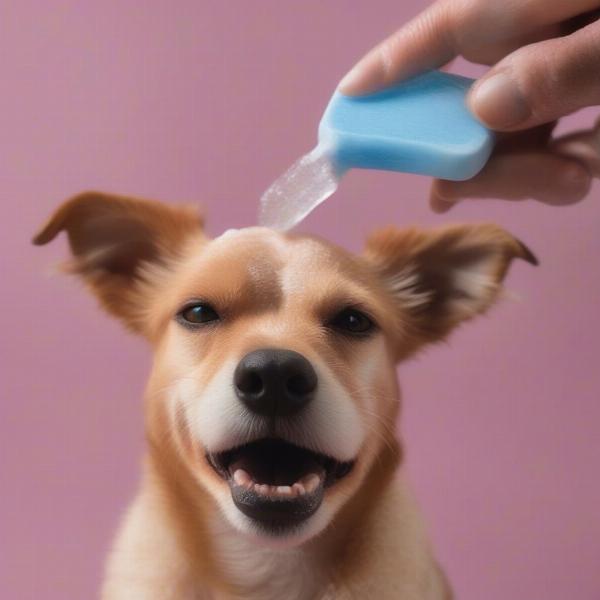Dog small bites, often seemingly insignificant, can actually reveal underlying issues ranging from playful nipping to more serious behavioral or medical concerns. Understanding the reasons behind these small bites is crucial for any dog owner, whether experienced or new to the world of canine companionship. This article will delve into the various causes of dog small bites, provide effective prevention strategies, and offer guidance on how to respond appropriately.
Decoding Doggy Nibbles: Why Does My Dog Give Small Bites?
Small bites from your furry friend can have various meanings, often depending on the context, the dog’s age, and its individual personality. Puppies, for instance, commonly engage in “mouthing” as a way to explore their environment and learn about bite inhibition.
In adult dogs, small bites might be a sign of playful interaction, especially during games like fetch or tug-of-war. However, small bites can also be a way for a dog to communicate discomfort, fear, or possessiveness. If your dog feels threatened or cornered, it might resort to small, warning nips to defend itself. Pain, due to an injury or underlying medical condition, can also manifest as increased biting behavior, even in typically gentle dogs.
Preventing Small Bites: Building a Harmonious Relationship
Proactive measures are key to minimizing small bites and fostering a safe and positive environment for both you and your dog. Early socialization is crucial, especially for puppies. Exposing them to various people, dogs, and situations helps them develop appropriate social skills and learn how to interact gently.
Consistent training, using positive reinforcement techniques, is also essential. Teaching basic commands like “leave it” and “drop it” can help prevent possessiveness and resource guarding, which are common triggers for biting.
Ensuring your dog gets adequate physical and mental stimulation through regular exercise, playtime, and interactive toys can also reduce the likelihood of small bites stemming from boredom or frustration.
Addressing Dog Small Bites: Appropriate Responses and When to Seek Help
While small bites might not always break the skin, it’s essential to address them promptly to prevent escalation. If your dog bites you during play, immediately stop the game and turn away. This teaches the dog that biting ends the fun. For bites related to fear or aggression, avoid punishment, which can worsen the behavior. Instead, consult with a certified professional dog trainer or behaviorist. They can help you identify the underlying cause and develop a customized behavior modification plan.
If the small bite breaks the skin, cleanse the wound thoroughly with soap and water. Monitor for signs of infection and seek medical advice if necessary.  Cleaning a dog bite wound If the bite is severe, or if you notice any behavioral changes in your dog, consult a veterinarian. Underlying medical conditions, such as dental problems or neurological issues, can sometimes contribute to biting behavior.
Cleaning a dog bite wound If the bite is severe, or if you notice any behavioral changes in your dog, consult a veterinarian. Underlying medical conditions, such as dental problems or neurological issues, can sometimes contribute to biting behavior.
Conclusion: Understanding Leads to Harmony
Dog small bites, while seemingly minor, can be a window into your dog’s world, revealing its needs, fears, and communication style. By understanding the underlying causes and implementing preventative measures, you can foster a stronger, more harmonious bond with your furry friend and create a safe environment for everyone. Remember, consistency, patience, and professional guidance when needed are key to addressing this common issue and building a positive, bite-free relationship.
FAQ:
- Why does my puppy nibble on my hands and feet? Puppies often explore their environment through their mouths. This is normal behavior, but it’s important to teach them bite inhibition early on.
- Can small dog bites be dangerous? Even small bites can carry the risk of infection. Always clean any bite wounds thoroughly.
- Should I punish my dog for small bites? Punishment is rarely effective and can often worsen the problem. Focus on positive reinforcement and redirection.
- When should I consult a professional about my dog’s biting behavior? If the biting is frequent, severe, or related to fear or aggression, it’s best to seek professional help.
- How can I teach my dog to stop biting during play? Stop playing immediately and turn away if your dog bites. This teaches the dog that biting ends the fun.
- What are some signs of fear or aggression in dogs? These can include tucked tail, flattened ears, whale eye (showing the whites of their eyes), lip licking, yawning, and growling.
- Can pain cause a dog to bite? Yes, pain from an injury or illness can make a dog more irritable and prone to biting.
Related Articles on ILM Dog:
About ILM Dog: ILM Dog is your trusted resource for all things canine. We offer expert advice on dog breeds, health, training, nutrition, grooming, and much more. From puppy care to senior dog support, we’re dedicated to providing dog owners worldwide with practical, reliable information. Contact us for all your dog-related inquiries: Email: [email protected], Phone: +44 20-3965-8624.